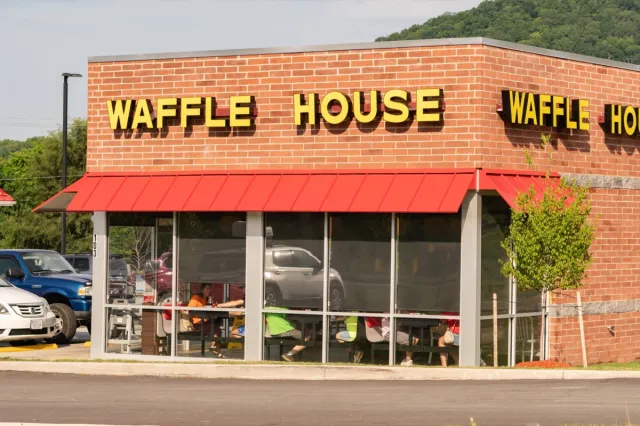This Iconic Restaurant Just Added a Surcharge for Every Egg You Buy

Eggs are ridiculously expensive right now and frequently difficult to source, and one major chain is responding by adding a surcharge for every egg sold. Guests at Waffle House will pay a 50-cent fee for every egg so the restaurant can try and cover costs.
"The continuing egg shortage caused by HPAI (bird flu) has caused a dramatic increase in egg prices," Waffle House said in the statement according to WANF-TV. "Customers and restaurants are being forced to make difficult decisions. We are continuously monitoring egg prices and will adjust or remove the surcharge as market conditions allow."
Waffle House has always been proud of the quality of eggs on the menu, sourcing their eggs from Rose Acre Farms, the second largest producer in the U.S. "More than a dozen family-operated farms supply Waffle House restaurants with eggs," according to the restaurant's website. "Of these, Rose Acre Farms is the largest and supplies over half of the eggs consumed at Waffle House. Even as it has grown to become one of the largest egg producers in the United States, Rose Acre Farms retains the family-owned values of excellence and integrity that characterized the business in its infancy back in the 1930s in southern Indiana."

Rose Acre Farms was hit hard with the avian flu, posting the news on X on January 28. "Our Cort Acre Egg Farm in Seymour, IN, recently tested positive for highly pathogenic avian influenza (HPAI), also commonly known as AI or bird flu. We started noticing mortality on Saturday, January 25, and we sent off samples to be tested as quickly as possible."
The outbreak in avian flu has severely disrupted the supply chain and price of eggs, with supermarkets frequently sold out of certain types and brands. The price of a dozen eggs cost an average of $4.82 at the beginning of 2023, according to the Bureau of Labor Statistics, down again to $2.52 at the beginning of 2024, and then up again to $4.14 in December 2024.
There is no telling when things will improve, experts warn. "Eggs are sold on markets as commodities, like corn and wheat, and wholesale prices for eggs are driven largely by supply and demand," Emily Metz, president and CEO of the American Egg Board, told USA TODAY. "Our supply has been tight due to highly pathogenic avian influenza, which is devastating to egg farmers. In the U.S. we've lost more than 40 million laying hens this year to bird flu."
Analysts are warning Americans to expect things to get worse before they get better, with the USDA forecasting a 20% increase in egg prices. "Being that it's winter and the peak of flu season, this egg supply and price situation has the potential to get much worse in the next six weeks," economist analyst Amy Nixon told USA TODAY. "In other words, it may be wise for all the health and fitness New Year's resolutioners to start seeking alternate forms of protein. And that weekend omelet brunch with your friends? Expect higher prices soon for that, too."









